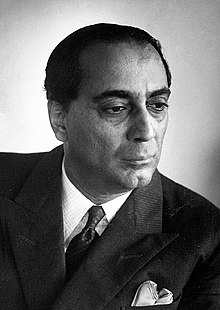Homi J. Bhabha
| Homi Jehangir Bhabha FRS |
|
|---|---|
 |
|
| Born |
30 October 1909 Bombay, British India (present-day India) |
| Died | 24 January 1966 (aged 56) Mont Blanc, France |
| Residence | New Delhi, India |
| Citizenship | India |
| Nationality | Indian |
| Fields | Nuclear Physics |
| Institutions |
Atomic Energy Commission of India Tata Institute of Fundamental Research Cavendish Laboratory Indian Institute of Science Turmbay Atomic Energy Establishment |
| Alma mater |
Cathedral & John Connon School University of Mumbai University of Cambridge |
| Doctoral advisor | Ralph H. Fowler |
| Other academic advisors | Paul Dirac |
| Known for |
Indian nuclear programme Cascade process of Cosmic radiations point particles Bhabha Scattering Theoretical prediction of Muon |
| Notable awards | Adams Prize (1942) Padma Bhushan (1954) Fellow of the Royal Society |
Homi Jehangir Bhabha (/ˈbɑːbɑː/;) (30 October 1909 – 24 January 1966) was an Indian nuclear physicist, founding director, and professor of physics at the Tata Institute of Fundamental Research. Colloquially known as "father of the Indian nuclear programme", Bhabha was the founding director of two well-known research institutions, namely the Tata Institute of Fundamental Research (TIFR) and the Trombay Atomic Energy Establishment (now named after him); both sites were the cornerstone of Indian development of nuclear weapons which Bhabha also supervised as its director.
Homi Jehangir Bhabha was born into a wealthy and prominent industrial Parsi family, through which he was related to Dinshaw Maneckji Petit, and Dorabji Tata. He was born on 30 October 1909, in an illustrious family with a long tradition of learning and service to the country. His father was Jehangir Hormusji Bhabha, a well known lawyer and his mother was Meheren. He received his early education at Bombay's Cathedral and John Connon School and entered Elphinstone College at age 15 after passing his Senior Cambridge Examination with Honors. His father's name, Jehangir, is from Persian (جهانگیر), meaning "conqueror of the world."
...
Wikipedia
